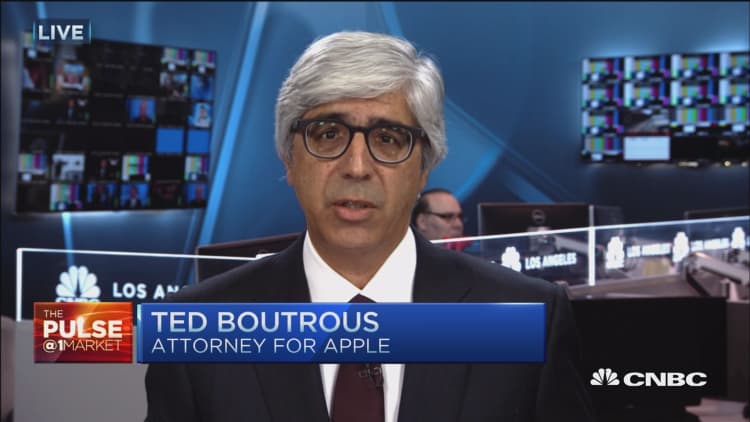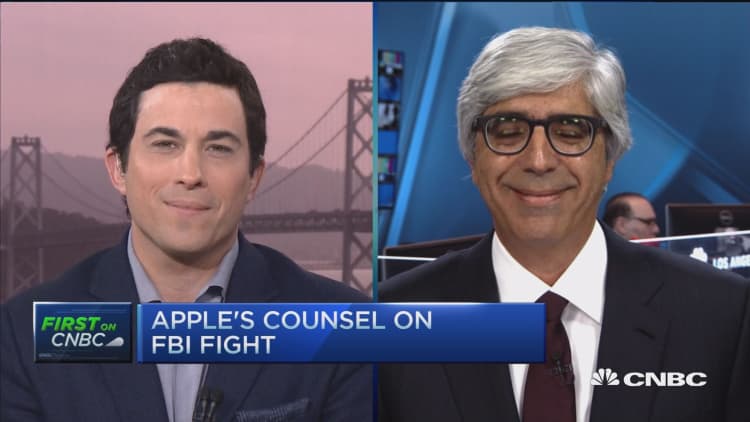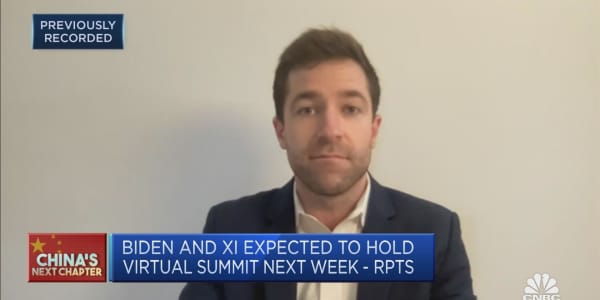


Imagine getting a soft drink from a vending machine using only your smartphone. Or scanning a QR code to buy goods from a newspaper ad.
By harnessing these innovations — and more — China mobile shopping is barreling ahead of the United States. China is still the world's largest smartphone market, even though growth is slowing. It accounts for about 30 percent of the global smartphone market, and Chinese smartphone users are expected to jump from 526.8 million to 640 million in 2018, according to eMarketer. And its shoppers are using their gadgets to snap up a wide array of goods and services.
Nearly half of all China's e-commerce sales, totaling $505.7 billion, are made with mobile devices, versus roughly one-quarter in the U.S., according to eMarketer. By 2019, China's mobile sales will account for 71 percent of those sales.
"We don't see mobile buying plateauing for the next five years," said Monica Pearl, eMarketer's director of forecasting. "They'll increase because consumer behavior has changed." Feature-rich, cheap smartphones are also helping fuel the boom, she added.
China is, after all, a mobile first market, explains Brian Buchwald, CEO of consumer intelligence firm Bomoda. So it has been able to leapfrog past other markets, which mainly used PCs for purchases.
Sophisticated mobile payment apps are partly fueling the mobile boom. To grease buying, purchases are smooth and nearly seamless, since goods are bought in a few seconds with just one click. And an intense fight for market share between payment titans WeChat Pay and Alibaba's Alipay is fueling even more innovation. Apple Pay has only just recently stepped into the competitive arena.
Meanwhile, the Chinese government has allowed a free-flowing retail and payments marketplace.
"There are no restraints," said Michael Zakkour, vice president of China/Asia Pacific practice at Tompkins International.
And that's good news for WeChat, A messaging app that's only five years old and is offered by the Internet giant Tencent. The app now has 650 million users. And a good chunk of them are using the app for mobile shopping. The result is that WeChat payments, along with Alibaba's Alipay, dominate the market. Because retailers can easily set up shop inside WeChat, users can plan family vacations, order a taxi or even design clothes without going anywhere else.
"WeChat is the most influential app in the world," said Buchwald. "It has the functionality of an iTunes store. So you can do anything you want."
This mobile preference is one-stop shopping for navigating a digital life. "We're talking about the emergence of chat commerce," said Lily Varón, an analyst at Forrester Research. "WeChat is becoming a commerce channel. And it's an ecosystem that's unlike anything in the U.S."
And, she adds, unlike the U.S., there's also no digital divide in China by geography or age. "It's not just limited to younger consumers," she said.
Meanwhile, e-commerce powerhouse Alibaba has its own Alipay app. Known as the PayPal of China, it is the dominant player in the mobile payment industry. And it's in a competitive tussle with WeChat to keep market share — fueling even more innovation.
"They're both spending billions building new features and technologies," said Buchwald. "That includes making lots of different investments in start-ups." For example, Alipay is now testing ways to let shoppers pay just by scanning a physical feature.
At the same time, Apple and Samsung are trying to break into this sector with partnerships with UnionPay, China's main bank card and payment firm.
The U.S. is lagging behind though, and mobile payments have yet to gain traction. Even QR codes, which have largely flopped in the U.S., are used everywhere in China to buy goods. And mobile phones there already have scanners embedded in them.
Once scanned and bought, goods are delivered quickly. And Alibaba, which has a massive logistics network, can get goods to customers within one day. Its ultimate goal is even loftier: deliveries to any Chinese city within 24 hours. Alibaba is even investing in drone companies, says Buchwald.
These hyperkinetic deliveries are fueling ever more purchases. Last year, China's Singles Day — a consumer shopping day invented by Alibaba and much like Black Friday in the U.S. — totaled $14.3 billion, which is 60 percent higher than 2014. Those sales total more than Black Friday and Cyber Monday sales in the U.S. combined.
"In China, spending as much money as possible on Singles Day is almost patriotic," said Buchwald. "It's more of a collectivist spirit there."
Emphasizing community good over the individual goes back thousands of years in China. "It's the cowboy vs. the collective," said Zakkour. "So Chinese people want to make sure that products they're buying have acceptance." For this reason, mobile commerce was predestined to become successful there, he added.
Los Angeles-based Revolve Clothing had to navigate this community spirit to sell its goods in China. "Social media there is very important," said Mike Karanikolas, co-CEO of Revolve, an online collection of up-and-coming fashion brands for men and women. "It's as if Amazon owned a big chunk of Facebook."
For the online apparel retailer, ramping up sales to the Chinese market meant navigating longer purchase cycles. Purchases in the U.S. are made quickly, he explains. But in China, purchases can take up to 30 days because many Chinese consumers spend a lot of time researching goods and then checking them out with a circle of friends before making an online purchase.
But in many ways, China's mobile mania may well be the new face of retailing.
China is up to three years ahead of the U.S. in mobile shopping, said Buchwald. "And it's moving faster than any other area of the economy. It's the future."
— By Constance Gustke, special to CNBC.com







